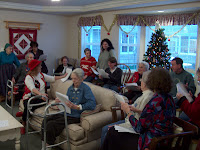 |
| My wonderful grandmother with her great-granddaughter. |
My grandma recently made the jump from living alone in her home in Chicago, Illinois, to living in a senior living community. On our recent visit, I could not help but notice an extra jump in her step. My grandma has always been sharp for her age, but the change of environment seemed to have magnified her usual witty self. The physical effects were readily noticeable too. She had lost a little weight and had much more energy. The social environment of being around new people and friends, instead of alone in her home, have seemed to have a wonderful effect on my sweet grandmother.
Senior living may not be for everyone, but, just as my family has recently seen with our grandma, it is a wonderful option for many seniors. The following was taken from an article written by Jeff Anderson of A Place for Mom, and discusses 8 different reasons why seniors prefer senior living to living alone:
8 Reasons Why Many Seniors Prefer Senior Living to Living Alone
Most seniors who have moved to independent living or assisted living communities report that they prefer life at their new home to life alone. Here are some common reasons why:
1. The end of yard work and home maintenance:
Keeping up a home is hard, especially for those of us who have developed physical ailments. Mowing the lawn, climbing a ladder to change light bulbs, shoveling snow, pulling weeds, vacuuming- these become things of the past. But don’t worry green thumbs: Residents are more than welcome to adopt a garden.
2. Vanquishing boredom:
Residents need never be bored at a senior community. There’s something for everyone. All kinds of entertainment and activities are offered, both on-site and out in the local community. Entertainment can range from visiting musicians and performers, to day trips that might include local landmarks, forays into nature, or just an outing to the local art museum.

Seniors who experience declines while living alone often thrive in a more supportive environment.
3. Better family relationships:
Older folks frequently become dependent on their grown children, or other close family members, for help of all kinds. Unnatural role reversals can strain relationships and foster unhealthy feelings of resentment, both by parents and their sons and daughters. Younger family members are liberated from the role of full-time caregivers, and are able to assure that time with their older loved one is meaningful and high-quality. Older residents are glad to return to the role of family matriarch or patriarch and often pleased that their grown children no longer have to “parent the parent”.
4. Better food:
There are many residents at senior communities who used to live alone, and were not eating right. Some skipped meals, some were living on ice-cream alone, and one lady would put cat-litter in the coffee brewer. At senior living communities, residents don’t have to worry about grocery shopping, meal preparation, or even coffee brewing. Instead, they get to enjoy a fine dining experience every day of the week. The food tastes good, alternative meals are almost always offered and special diet needs can ordinarily be accommodated. It’s common for new residents, who had been eating poorly before they moved-in, to experience breathtaking improvements in their health and wellbeing just from three square meals per day.
5. No more stressful driving:
Driving can be a tense and stressful as we age, and our driving abilities may not be what they once were either. For these reasons, most residents prefer to take advantage of the free transportation that’s provided by independent and assisted living communities. There’s no need to rely on a car any longer, although parking is available for residents who still drive.
6. Feeling like myself again:
Living alone, we may not be able to participate in games and activities we enjoyed, that were both fun, and helped keep us sharp. But senior communities offer a wealth of opportunities to keep engaged. This can include favorite games like chess, bridge and poker, engaging reading groups and discussion groups, and fascinating classes and lectures on every conceivable topic.
7. Making new friends:
Older adults who live alone often become isolated, which is unhealthy at any age. At senior communities we can make friends, share a meal, and enjoy festive occasions with one another. On the other hand, those of us who are more introverted appreciate that our privacy is respected, but are still glad to have folks around.
8. Finally feeling safe:
Residents can rest easy knowing that they are secured from thieves, con-men and ne’er-do-wells. Furthermore, residents enjoy the peace of mind that comes from the emergency response systems that are in each apartment, or sometimes on the resident’s person as a pendant. This alleviates fears about falling and becoming trapped for hours or even days, a scenario that’s all too common for senior’s residing alone.
Certainly, there are seniors who live alone and are just fine. We recognize that senior communities aren’t for everyone. But it’s without doubt that there are vast numbers of seniors living alone in unsafe or unhealthy situations who would benefit immensely from life at a senior community...

 The No. 1 online destination for people over 65 in November 2009 was Google Search, with 10.3 million unique visitors. Windows Media Player and Facebook were No. 2 and No. 3, with 8.2 million and 7.9 million visitors, respectively. Interestingly, Facebook, which came in at No. 3 in 2009, ranked No. 45 in 2008 among sites visited by senior citizens.
The No. 1 online destination for people over 65 in November 2009 was Google Search, with 10.3 million unique visitors. Windows Media Player and Facebook were No. 2 and No. 3, with 8.2 million and 7.9 million visitors, respectively. Interestingly, Facebook, which came in at No. 3 in 2009, ranked No. 45 in 2008 among sites visited by senior citizens.









